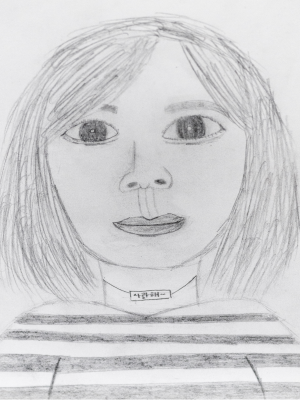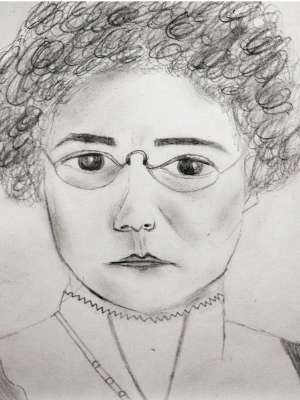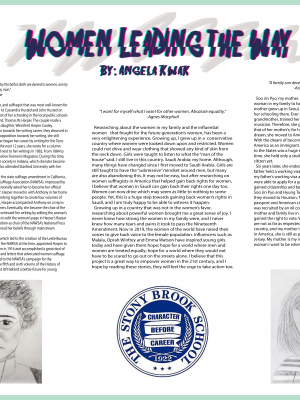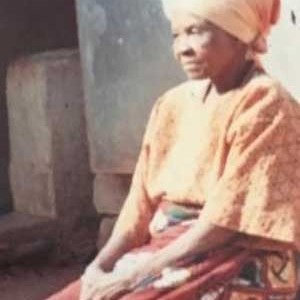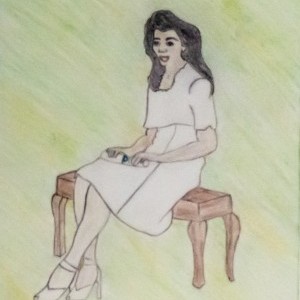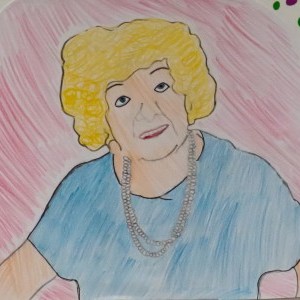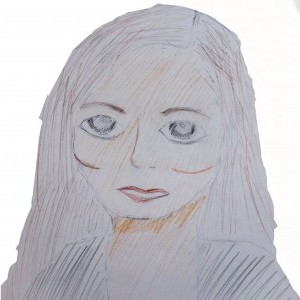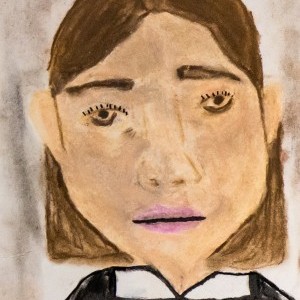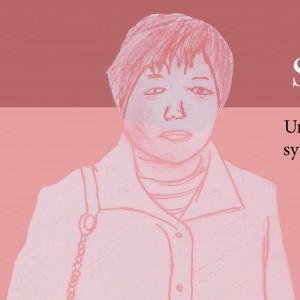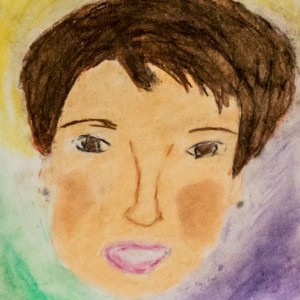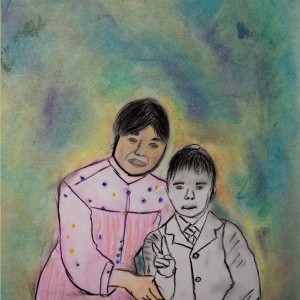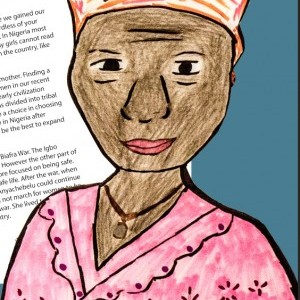Angela Kwak
The Stony Brook School | Stony Brook, NY | 9-12th Grade
Inspirational Family Member
My Mother
Soo Jin Pyo, my mother, is a strong and powerful woman, as well as the first woman in my family to have gained the right to vote in America. My mother grew up in Seoul, Korea for most of her life and completed most of her schooling there. Ever since she was a child, her mother, my grandmother, trained her and my uncle to become a musician. Therefore, she grew up playing the piano and her dream was that of her mother’s, for her to play music. As the first step towards her dream, she moved to America to attend a college in New Jersey. With the dream of becoming an organist and a better life, she moved to America as an immigrant. Before this, she had never left Korea, so moving to the States was a huge help as well as a risk for her in life. During this time, she held only a student visa in the U.S. and was not an American citizen yet.
Six years later, she ended up meeting my father in Ohio. At the time, my father held a working visa and had just completed graduate school. With my father’s working visa and my mother’s job in the United States, they were able to apply for a green card in America. Five years later, they had gained citizenship. Two years thereafter, my parents, Soo Jin Pyo and Hyung Tae Kwak, got married. When I was born, they moved to Houston, where I was eligible to receive an American passport and American citizenship. When I was five years-old, my father was recruited by an oil company in Saudi Arabia as a scientist. Now, my mother and family live in a country where, unfortunately, women are not respected as much as men. Even though we live in this kind of country, and my mother is not able to express as many rights contrary to in America, she is still as powerful as she was when she first moved to New Jersey. My mother is my inspiration and role model. She is the kind of woman I want to be when I grow up.
Historical Figure I Admire
Ida Husted Harper
Ida A. Husted Harper was an American journalist, author, and suffragist that was most well-known for her “women-focused” writings in the press. She was born to Cassandra Husted and John H. Husted on February 18, 1851. Harper grew up in Indiana and did most of her schooling in the local public schools there. When she was twenty years-old, she married her husband, Thomas W. Harper. The couple made a home in Terre Haute, Indiana, and shortly after, had their daughter, Winnifred Harper Cooley. Unfortunately, due to her husband’s persistent opposition towards her writing career, they divorced in February of 1890. Although, even with her ex-husband’s opposition towards her writing, she still launched her career successfully in the early 1870s. Harper began her career by writing for the Terre Haute Evening Mail underneath a male pseudonym. For the next twelve years, she wrote for a column called, “A Woman’s Opinions.” Her name was only released next to her writings in 1882. From 1884 to 1893, Ms. Harper wrote a women’s column for the Locomotive Firemen’s Magazine. During this time, she also assisted in the making of a state women’s suffrage society in Indiana, of which she later became the secretary in 1887. Whilst writing her column, she also attended Stanford University with her daughter, but did not end up earning a degree.
In 1896, she controlled press relations in a campaign for the state suffrage amendment in California, which was organized by the National American Woman Suffrage Association (NAWSA). Impressed by Harper’s work during the campaign, Susan B. Anthony personally asked her to become her official biographer. Thrilled to have been given this offer, in 1897, Harper moved in with Anthony in her home in Rochester, New York. Harper and Anthony ended up working together to create four volumes of memoirs. The year after the second volume was released, Harper accompanied Anthony on a trip to London as a delegate of the International Council of Women. Eventually, she became the chair of the press committee for the council from 1899 to 1902. She continued her writing by editing the women’s column in the New York Sunday Sun. Later on, she began to edit the women’s page in Harper’s Bazaar for four more years. During this time, Harper took the position as chair of the NAWSA National Press Bureau in New York City. Through this, she was able to spread her beliefs through mainstream newspapers to many leading cities in the country.
In 1916, Miriam Leslie left behind a bequest to NAWSA, which led to the creation of the Leslie Bureau of Suffrage Education. Carrie Chapman Catt, president of NAWSA at the time, appointed Harper to lead this effort. To fulfill this job, she moved to Washington in 1916 and accomplished a great deal of work as a suffragist. She wrote many articles, pamphlets, and letters that advocated women’s suffrage during her stay in D.C. Harper’s efforts greatly contributed to the NAWSA campaign for the Nineteenth Amendment. In her 70s, Harper published the fifth and sixth volume of the History of Woman Suffrage. Harper passed away at the age of 80, but left behind a better future for young women today.
What the Project Means to Me
Researching about the women in my family and the influential women that fought for future generations of women, has been a very enlightening experience. Growing up, I grew up in a conservative country where women were looked down upon and restricted. Women could not drive and wear clothing that showed any kind of skin from the neck down. Girls were taught to listen to what the “man of the house” said. I still live in this country, Saudi Arabia, my home. Although many things have changed since I first moved to Saudi Arabia, girls are still taught to have a “submissive” mindset around men, but many are also abandoning this. It may not be easy, but after researching on women suffragists in America that helped gain back rights for women, I believe that women in Saudi can gain back their rights one day too. Women can now drive which may seem as little to nothing to some people. Yet, this is a huge step towards gaining back women’s rights in Saudi, and I am truly happy to be able to witness it happen. Growing up in a country that was not in women’s favor, researching about powerful women brought me a great sense of joy. I never knew how strong the women in my family were, and I never knew how many tears and pains it took to pass the Nineteenth Amendment. Now in 2019, the women of the world have raised their voices to give back voice to the female population. Influencers such as Malala, Oprah Winfrey, and Emma Watson have inspired young girls today and have given them hope, hope for a world where men and women are treated equally, hope for a world where they would not have to be scared to go out on the streets alone. I believe that this project is a great way to empower women in the 21st century, and I hope by reading these stories, they will feel the urge to take action too.
Explore the Archive
More From This Class
Click on the thumbnails below to view each student's work.Deadline Extended
There's still time to join Women Leading the Way.
Become a part of our storytelling archive. Enroll your class today.
Join the Project

